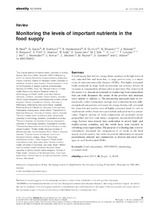Monitoring the levels of important nutrients in the food supply
Date
2013Author
Neal, B.
Sacks, G.
Sanders, David
Swinburn, B.
Vandevijvere, S.
Dunford, E.
Snowdon, W.
Webster, J.
Barquera, S.
Friel, S.
Hawkes, Corinna
Kelly, B.
Kumanyika, S.
L’Abbé, M.
Lee, A.
Lobstein, T.
Ma, J.
Macmullan, J.
Mohan, S.
Monteiro, Carlos
Rayner, M.
Walker, C.
Metadata
Show full item recordAbstract
A food supply that delivers energy-dense products with high levels of
salt, saturated fats and trans fats, in large portion sizes, is a major
cause of non-communicable diseases (NCDs). The highly processed
foods produced by large food corporations are primary drivers of
increases in consumption of these adverse nutrients. The objective of
this paper is to present an approach to monitoring food composition
that can both document the extent of the problem and underpin
novel actions to address it. The monitoring approach seeks to systematically
collect information on high-level contextual factors influencing
food composition and assess the energy density, salt, saturated
fat, trans fats and portion sizes of highly processed foods for sale in
retail outlets (with a focus on supermarkets and quick-service restaurants).
Regular surveys of food composition are proposed across
geographies and over time using a pragmatic, standardized methodology.
Surveys have already been undertaken in several high- and
middle-income countries, and the trends have been valuable in
informing policy approaches. The purpose of collecting data is not to
exhaustively document the composition of all foods in the food
supply in each country, but rather to provide information to support
governments, industry and communities to develop and enact strategies
to curb food-related NCDs.

